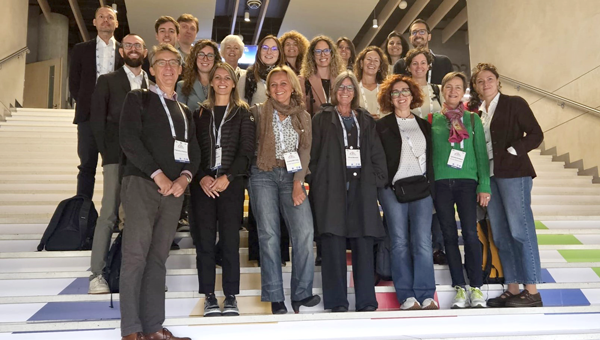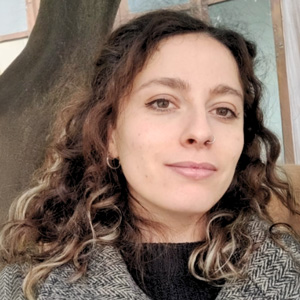Strengthening evidence together: the Cochrane Italy experience
Authors: Claudia De Santis1, Elisa Baldin1, Francesco Nonino1
1. IRCCS Istituto delle Scienze Neurologiche di Bologna, Unit of Epidemiology and Statistics, Cochrane, Italia
Key take-home messages
- Evidence is impactful on health only when it is shared and understood.
- Volunteers play a pivotal role in making evidence accessible and understandable by everyone.
- Universities will be key partners in embedding evidence-based healthcare into future medical practice.
Introduction
On World Evidence-Based Healthcare (EBHC) Day 2025, the global evidence community comes together to reflect on how knowledge is created, shared and used to improve health outcomes. This year’s theme, Collaborative Knowledge Communication, reminds us that evidence is not meaningful until it is contextualised, communicated and co-produced with the people who mostly need it. The way we communicate knowledge is as critical as the knowledge itself.
Over the past year, Cochrane Italy has experienced firsthand how collaboration, sharing and ‘people energy’ can transform knowledge translation from an abstract concept into solid practice. In the past year, our online presence has grown dramatically, evolving into a dynamic ecosystem of communication and engagement.
Creating an online presence
Cochrane Italy Geographic Group is the hub of an established Cochrane network since 1994. Although our activities were recognised among senior academics and researchers, we felt the need to reach a broader audience, including clinicians, students, patients and the general public. Social media offer access to any kind of information, including biased, inaccurate or misleading data. As advocates of evidence-based research and practice, we knew that to strengthen our presence in Italy and act as a source of reliable, unbiased evidence, we had to reach our target audience in the place where everyone looks for information: online.
Thanks to a coordinated dissemination strategy and the dedication of our volunteers, the years 2024–2025 marked a turning point. In just over a year, we built a thriving online community:
- LinkedIn: Our page, launched in May 2025, already has more than 2,600 followers, growing at an impressive 29% monthly rate: this means on average 7 new followers a day, spanning 19 of 20 Italian regions and 16 countries worldwide. Engagement comes not just from academics, but also from practitioners, patients and students.
- Newsletter: With 189 subscribers across Italy, our bi-monthly newsletter provides accessible updates on Cochrane principles, methods and training opportunities.
- YouTube: We regularly upload our seminars and webinars to our dedicated YouTube channel, available and free for all. So far, we have gained 72 subscribers and a total of 726 views.
- Resources: Our Resources webpage is regularly updated with what we have produced to date: blogshots, visual abstract, podcasts, and complex evidence reported in a way that is visually engaging and easy to share on social platforms.
By diversifying our dissemination channels and communication products, we opened the doors of evidence-based healthcare to a much wider audience. We actively gathered feedback from readers via comments and polls on social media, using their suggestions to adjust our content and ensure it addressed their interests and needs.
The pivotal role of volunteers
Our progress would have been impossible without the contribution of 12 active volunteers, most of them students from diverse professional backgrounds. They have translated, simplified, illustrated and shared Cochrane evidence in ways that resonate with different audiences.
For them, volunteering is not only a way to contribute but also a chance to learn and grow. As one of our volunteers explained:
‘I chose to volunteer for Cochrane Italy because I firmly believe that evidence-based medicine is essential to making clinical decisions safer and more effective. Growing up in Syria, I witnessed the difficulties of a healthcare system in crisis, which motivated me to promote practices supported by solid scientific evidence. Cochrane Italy offers an extraordinary opportunity to learn, share and put evidence-based principles into practice, contributing to better clinical guidelines and the quality of healthcare.’ (Gioia Dahdal)
For many of our volunteers, collaborating with Cochrane Italy is where theory meets practice, an opportunity to move beyond concepts and see how evidence can practically help people.
‘Cochrane Italy has allowed me, through the various activities offered, to consolidate both the specific knowledge and skills of my field of study and more general competencies in healthcare. It has given me the opportunity to contribute to the world of evidence-based medicine, particularly in the areas of preventive and rehabilitative medicine.’ (Matteo Famularo)

Knowledge translation as collaboration
We received the first favourable feedback on our communication approach during the Global Evidence Summit in Prague, where we met with our affiliates and long-time supporters and collaborators from Cochrane Italy.
Many other collaborators have helped us this year in improving and broadening our activities, and new collaborators are reaching out to find out how they can help.
The heart of our work this year has focused on Knowledge Translation (KT), which Cochrane defines as the use of scientific evidence in health decision-making. KT is not simply about publishing research. It is about making knowledge accessible, understandable and relevant to those who need it. In the past year, with the help of our volunteers, Cochrane Italy produced a wide range of KT resources designed to help clinicians, policymakers and citizens critically evaluate health interventions:
- Translations of ‘Pensamiento crítico en salud‘ developed by Cochrane Iberoamerica into Italian, to help Italian citizens strengthen their critical thinking about health claims. The articles are based on the key concepts of the ‘Informed Health Choices’ project.
- Slide-sets entitled ‘Ricerca Semplice‘ (‘Simple Research’) explaining key research topics, from evidence-based medicine to network meta-analysis, in plain language.
- Blogshots for 38 Cochrane reviews (simple, graphical summaries of systematic reviews) and three visual abstracts translated. Finally, we translated 9 Cochrane podcasts into Italian, now available as audio summaries in the Cochrane Library.
Looking ahead: Universities as partners in knowledge communication
We believe that universities are essential partners in embedding evidence-based healthcare into culture and practice. This year we began collaborating with the University of Padova through a seminar entitled ‘The Role of Systematic Reviews in the Health Decision-Making Ecosystem‘. In our research institute (IRCCS Istituto delle Scienze Neurologiche di Bologna), we organised a series of nine free hybrid seminars on systematic reviews, guidelines and research methods, attracting an average of 65 participants each time, both in-person and online.
Our next step is to build a comprehensive strategy for university engagement by:
- Learning from academic communities, listening to their needs and expectations.
- Developing training opportunities tailored for students and young researchers, finding ways of incorporating them in their curricula.
- Creating collaborative projects where students co-produce dissemination materials.
- Expanding opportunities to volunteer, so that more students can participate actively in knowledge translation projects.
By involving universities, we hope to reach the next generations of health professionals in order to provide them with tools and competences not only to retrieve and use the best available evidence, but also to appraise it and improve its quality.
Conclusion
Collaborative knowledge communication is strategic for the global evidence community.
In the coming years, healthcare systems will face complex challenges: misinformation, political pressures and technological advancements. Addressing these challenges requires not only producing high-quality evidence but also ensuring that evidence travels effectively across borders, disciplines and communities. With the appropriate tools and effective partnerships, evidence can move from research papers to social media feeds, offering a safe, reliable alternative to misinformed claims.
With these achievements as a starting point, we recognise the importance of engaging end-users (e.g. patients, citizens, policymakers) not only as recipients but as co-creators of knowledge. We plan to strengthen this involvement by partnering with patient associations and exploring citizen polls or review panels to test and improve the clarity and usefulness of our dissemination materials.
On World EBHC Day 2025, we celebrate how far we have come and how much further we can go. Cochrane Italy is committed to turning evidence into action through collaborative knowledge communication in our country.
We invite colleagues, students, policymakers and citizens to join us in this journey. Evidence generation and synthesis is not enough: it must be effectively disseminated and discussed together. Only then can it fulfil its true purpose: improving health outcomes for all.
Links to Additional Resources
References
Cochrane Italy Annual Report 2024-2025. Available at https://www.cochrane.it/it/news/report-annuale-2024-2025
To link to this article - DOI: https://doi.org/10.70253/GYMY6337
Disclaimer
The views expressed in this World EBHC Day Blog, as well as any errors or omissions, are the sole responsibility of the author and do not represent the views of the World EBHC Day Steering Committee, Official Partners or Sponsors; nor does it imply endorsement by the aforementioned parties.
